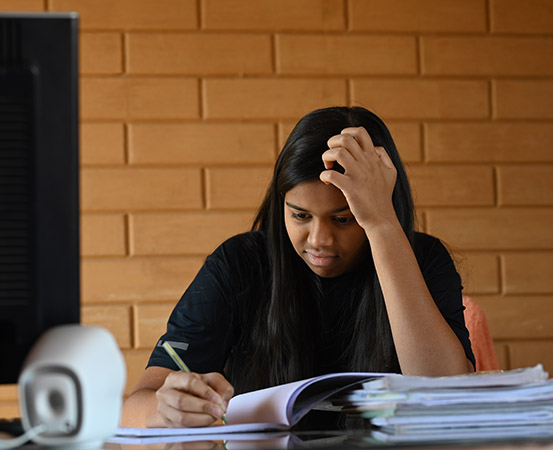
It’s that time of the year when exam stress makes children put a pause on playtime and flock frantically to tuition centres. Exam season causes intense stress among students, especially among first-time board examinees post the pandemic who largely attended online classes. In addition, there is parental pressure as well.
Priya (name changed), a homemaker from Kochi, sees increased stress in her son Rohit and his peers as they are appearing for their 12th board examinations soon. “As he was attending online classes, he was unable to experience the classroom setting and had difficulty keeping up with the syllabus,” she explains. Rohit fears whether he will be able to finish the exam on time.
How can parents relieve exam stress?
“Parents need to understand that every child has some amount of anxiety before and while preparing for board exams, and they cope with it differently. So, parents must ensure that they support their children at all times,” says Dr John Vijay Sagar, professor and head of the department of child and adolescent psychiatry, NIMHANS, Bengaluru.
Dr Sagar points out that the anxiety and stress that children experience can be due to multiple reasons. “Preparing for exams, scoring high marks and completing the exam on time are some of the prominent factors that can cause stress,” he says.
In addition, Dr Sagar also points out that there may be instances when the anxiety may become severe. “Parents whose children suffer from high bouts of anxiety must be extremely cautious during this period as the child may fall into a depressive state if he/she feels pressurised,” he says. “In such cases, parents should take note when there is a sudden shift in their mood or temperament and if they have a lack of sleep or appetite. If left unnoticed, the child may even have thoughts of self-harm,” warns Dr Sagar.
Physical signs of stress in children
Dr Sagar also mentions that other visible physical changes include excessive sweating, palpitation and headaches. “In such an unfortunate situation, parents must bring their child to a professional immediately to be examined and treated,” he says.
Dr Sagar also emphasises that parents being anxious regarding their children’s performance can also be a major trigger for their children’s anxieties. “Parents should have open communication with their children. When children express certain worries, they must patiently listen. They must not chide and tell them that they’ve been through the same issues. The problems that their children face may not be like their own,” he says.

Let children make their own study plan
According to Kelly Noronha, counsellor, Bloomz International School, Nuvem, Goa, children feel unwarranted pressure when they are constantly compared to their counterparts. “We notice parents asking about the performances of their children’s classmates, especially during PTA meetings. We do not encourage this as it will only burden the children to prepare more than they are capable of,” she explains.
Like Rohit, all his peers are fearful of facing board examinations for the first time, says Noronha. “Children find it difficult to complete their vast syllabus,” she says. “As they were attending online classes for two whole years, children have forgotten how much to write and prepare for each subject.”
Noronha also says that parental pressure is an added concern. “Parents expect children to perform their best, score top rank and choose a stream of their [own] preference. However, two years ago, they were just in middle school and had no such pressures. Their current struggle is visible,” she says.
To tackle this problem, Noronha recommends children to come up with their own preparation methods and techniques that work for them and advises parents to aid their children in this process. For instance, allowing a child to study at afternoon or night if he/she prefers it instead of pressurising him/her to wake up and study early in the morning. “In case the student does not get better from these tips, we connect with parents and inform them what the child is going through, as some parents wouldn’t know what is happening to their child. Unless they know the situation, they can’t remedy it,” she says.
Takeaways
- Children tend to feel high bouts of anxiety and stress during exam season due to various reasons which include exam preparations, securing top grades, remembering the right answers, meeting expectations of their parents, teachers and peers, etc.
- If a child’s anxiety is left unnoticed or untreated, it may lead to physical and psychological issues.
- Parents must provide a worry-free environment for their children and aid them to come up with their own study plan without having unrealistic expectations.


















3 Responses
Nice article
Good one
Good job. Has useful tips and information for students and parents.